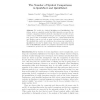Free Online Productivity Tools
i2Speak
i2Symbol
i2OCR
iTex2Img
iWeb2Print
iWeb2Shot
i2Type
iPdf2Split
iPdf2Merge
i2Bopomofo
i2Arabic
i2Style
i2Image
i2PDF
iLatex2Rtf
Sci2ools
105
Voted
ICALP
2009
Springer
2009
Springer
The Number of Symbol Comparisons in QuickSort and QuickSelect
Abstract We revisit the classical QuickSort and QuickSelect algorithms, under a complexity model that fully takes into account the elementary comparisons between symbols composing the records to be processed. Our probabilistic models belong to a broad category of information sources that encompasses memoryless (i.e., independent-symbols) and Markov sources, as well as many unbounded-correlation sources. We establish that, under our conditions, the average-case complexity of QuickSort is O(n log2 n) [rather than O(n log n), classically], whereas that of QuickSelect remains O(n). Explicit expressions for the implied constants are provided by our combinatorial?analytic methods.
Average-case Complexity | Classical Quicksort | ICALP 2009 | Markov Sources | Theoretical Computer Science |
| Added | 03 Dec 2009 |
| Updated | 03 Dec 2009 |
| Type | Conference |
| Year | 2009 |
| Where | ICALP |
| Authors | Brigitte Vallée, James Allen Fill, Julien Clément, Philippe Flajolet |
Comments (0)

